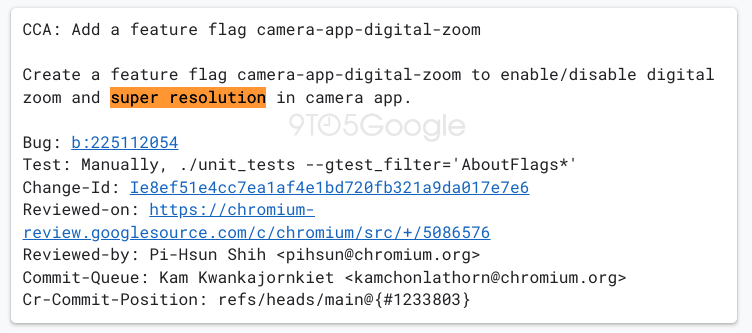
Google has begun experimenting with bringing the equivalent of the Super Res Zoom feature of Pixel phones to Chromebooks.
Most Chromebooks are equipped with a front-facing camera for the sake of video calls. More recently, Google has begun requiring the use of a higher-quality camera for a new device to qualify as a “Chromebook Plus,” which also brings a set of exclusive features.
However, some ChromeOS devices – including Google’s ill-fated Pixel Slate and the Lenovo IdeaPad Duet series – also include a “world-facing” camera, often with a higher resolution than the selfie camera. While niche, these outer cameras are useful for capturing/sharing things that are further away, such as friends and family or your surroundings.
Of course, one of the downsides of using your Chromebook to take photos instead of your phone – beyond looking quite ridiculous – is that ChromeOS doesn’t offer the same level of photo processing features as you’d find on something like the Pixel’s Google Camera app. Google has made some headway on that disparity, with Chromebook Plus devices gaining built-in lighting enhancement and background blur features.
The next feature to make its way from Pixel phones to Chromebooks may be a rival to Super Res Zoom. As detailed in a recent code change, the ChromeOS Camera app is on track to gain digital zoom (a feature it surprisingly never had before) paired with “super resolution.”

The feature will initially only be available behind a flag in chrome://flags. The flag is available on the latest Dev channel build, but it currently has no noticeable effect.
Camera App Digital Zoom
Enable this flag to use digital zoom in Camera app.
#camera-app-digital-zoom
On Pixel phones, Super Res Zoom uses machine learning (ML) to make zoomed-in photos appear sharper without the use of a proper telephoto lens. Pro-level Pixel phones take the feature a step further, combining Super Res Zoom with a telephoto lens to enable up to 30x hybrid zoom.

The feature should work almost identically on Chromebooks, with super resolution enabling still images to appear crisp. Notably, there don’t currently appear to be any restrictions on which Chromebooks can take advantage of super resolution. However, Google does carve out some unique code for “Geralt,” a codename that refers to the upcoming MediaTek MT8188 chipset.
Overall, the addition of digital zoom to ChromeOS is quite curious. The current Chromebook Plus-exclusive camera features are all designed to improve video quality, while super resolution is only being tested for “still captures.” It’s possible we may see more ChromeOS laptops and tablets arrive with outer cameras to justify the need for something like Super Res Zoom.
FTC: We use income earning auto affiliate links. More.



Comments